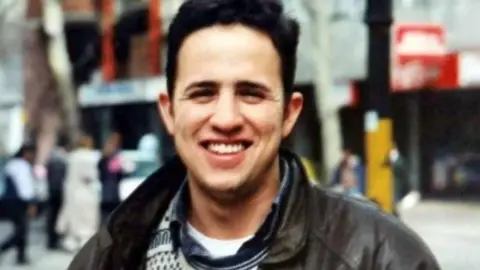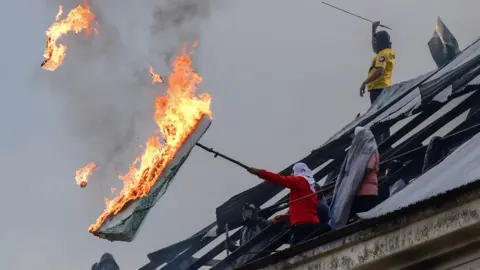Coronavirus: My son's asthmatic killer doesn't deserve to die in jail
 Alejo Hunau
Alejo HunauA woman in Argentina has written to authorities to support the release of her son's killer from prison during the coronavirus pandemic, recognising that his asthma puts him at risk.
Silvia Ontivero had earlier contacted magistrates in February, urging the killer's parole request be rejected.
However, she said the current crisis had made her think again.
"I have had rage. I have had hate. But I have never wished him dead," she wrote in an open letter.
On Tuesday, Argentina's President Alberto Fernández endorsed a plan to protect prisoners by moving them to house arrest where possible.
There have been riots in prisons across the country in recent weeks, amid fears that the virus could spread quickly within the overcrowded and poorly sanitised spaces.
The president's decision has caused controversy, with some fearing justice is being undone, while others insist the releases should be more widespread.
 Getty Images
Getty ImagesSilvia Ontivero's son, Alejo Hunau, was murdered in the Andean city of Mendoza in 2004.
Diego Arduino was sentenced to 16 years for the crime.
In a hearing on Tuesday, Judge Mariana Gardey said Arduino was one of 400 prisoners in the Mendoza region considered at risk because of underlying health conditions.
In an open letter released to the local press, Mrs Ontivero said she had thought long and hard, and come to support the idea of house arrest.
"We are talking about something different now. A pandemic. There is overcrowding in prisons and I can imagine the fear that people inside are feeling," she wrote.
She also told the TN news site that keeping him in prison would be a death sentence, which was something she had always been against.

- A SIMPLE GUIDE: How do I protect myself?
- AVOIDING CONTACT: The rules on self-isolation and exercise
- MAPS AND CHARTS: Visual guide to the outbreak
- VIDEO: The 20-second hand wash
- STRESS: How to look after your mental health

Mrs Ontivero was a political prisoner for seven years during the country's military dictatorship, which lasted from 1976 until 1983.
She has previously said her incarceration gave her time to reflect and she wanted to be sure Arduino had enough time to do the same, and make himself a better man, which is why she had opposed an early release.
Her son was a journalist and adviser to the government of Mendoza
He was killed in his apartment, having been struck by a wine bottle.
On Monday, a riot broke out at a prison in the Peruvian capital, Lima, leaving nine people dead. Prison authorities said it was an attempt by the inmates to "facilitate a mass breakout" after two prisoners died of Covid-19.
UN Human Rights High Commissioner Michelle Bachelet, the former president of Chile, has called sanitary conditions in Latin American prisons "deplorable" and called for releases of less dangerous inmates.
Chile and Colombia have released thousands of prisoners because of the pandemic. Last week, Mexico's Senate approved a measure to take similar steps.
El Salvador, however, has taken a hardline approach, insisting convicted gangsters are taking advantage of the pandemic.
On Wednesday, there was further controversy in Argentina, after Carlos Capdevila, a doctor convicted of crimes against humanity, was among those to be granted house arrest.
A judge said the 70-year-old prisoner, who worked at the notorious Esma detention centre during the dictatorship, was at risk from Covid-19 because of "high blood pressure, prostate cancer and motor difficulties".
